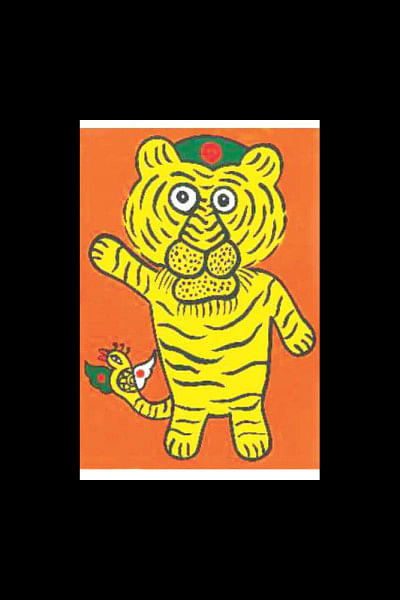Japanese businesses launch mascot for Bangladesh

A group of Japanese businesses yesterday launched a mascot, Bantora Kun, as part of a project to brighten Bangladesh's image in Japan.
The project intends to specifically tackle Bangladesh's image as a disaster-prone country, affected by both natural and man-made calamities, which is the current perception among most Japanese.
Bantora is a compound word where 'Ban' stands for Bangladesh and 'tora' is Japanese for 'tiger', and Kun is Japanese for sibling. Bantora Kun will work as Yuru-chara, a Japanese term for mascot characters, to brighten the image of Bangladesh in Japan.
Yuru-charas are created to promote a place, region, event, organisation or business in Japan.
Bantora Kun will promote Bangladesh, both as a country and a preferred destination for Japanese investment. Bangladesh is second to China as a garment exporter worldwide, and on the natural front, it possesses the world's longest unbroken sea beach at Cox's Bazar.
Commerce Minister Tofail Ahmed inaugurated the mascot at a function at Pan Pacific Sonargaon Hotel in Dhaka.
Bantora Kun is a joint initiative of the Japanese Commerce and Industry Association in Dhaka, a body of Japanese businessmen in Bangladesh, and Japan External Trade Organisation. More than 230 Japanese companies are operating in Bangladesh at present.
Bangladesh gives priority to Japanese entrepreneurs and is working on creating a special economic zone for Japanese investors in Chittagong, the commerce minister said.
This is a good beginning as we are eager to brand Bangladesh positively in parts of the world, said Ahmed.
“Japan, as a close friend, has taken that responsibility, and the Japan Chamber of Commerce will also work as Bangladesh's ambassador.”
Trade between Japan and Bangladesh is close to $2.5 billion, but there is scope to increase it to $4 billion, especially by increasing Bangladesh's exports, he said.
Bangladesh exported goods worth $900 million to Japan and imported goods worth around $1.5 billion last fiscal year. The minister said Bangladesh's exports to Japan, especially garment items, have been increasing due to the duty-free benefit enjoyed by all Bangladeshi products, except glove items and arms and ammunition.
“Bangladesh's tiger image will create a better understanding of the country and inspire Japanese businesses to interact with Bangladesh more, on all fronts,” said Masato Watanabe, Japanese ambassador to Bangladesh.
Watanabe said he considers Bangladesh as a potential economic hub for the South Asian region, which encourages businesses to invest more in the country.

 For all latest news, follow The Daily Star's Google News channel.
For all latest news, follow The Daily Star's Google News channel. 



Comments